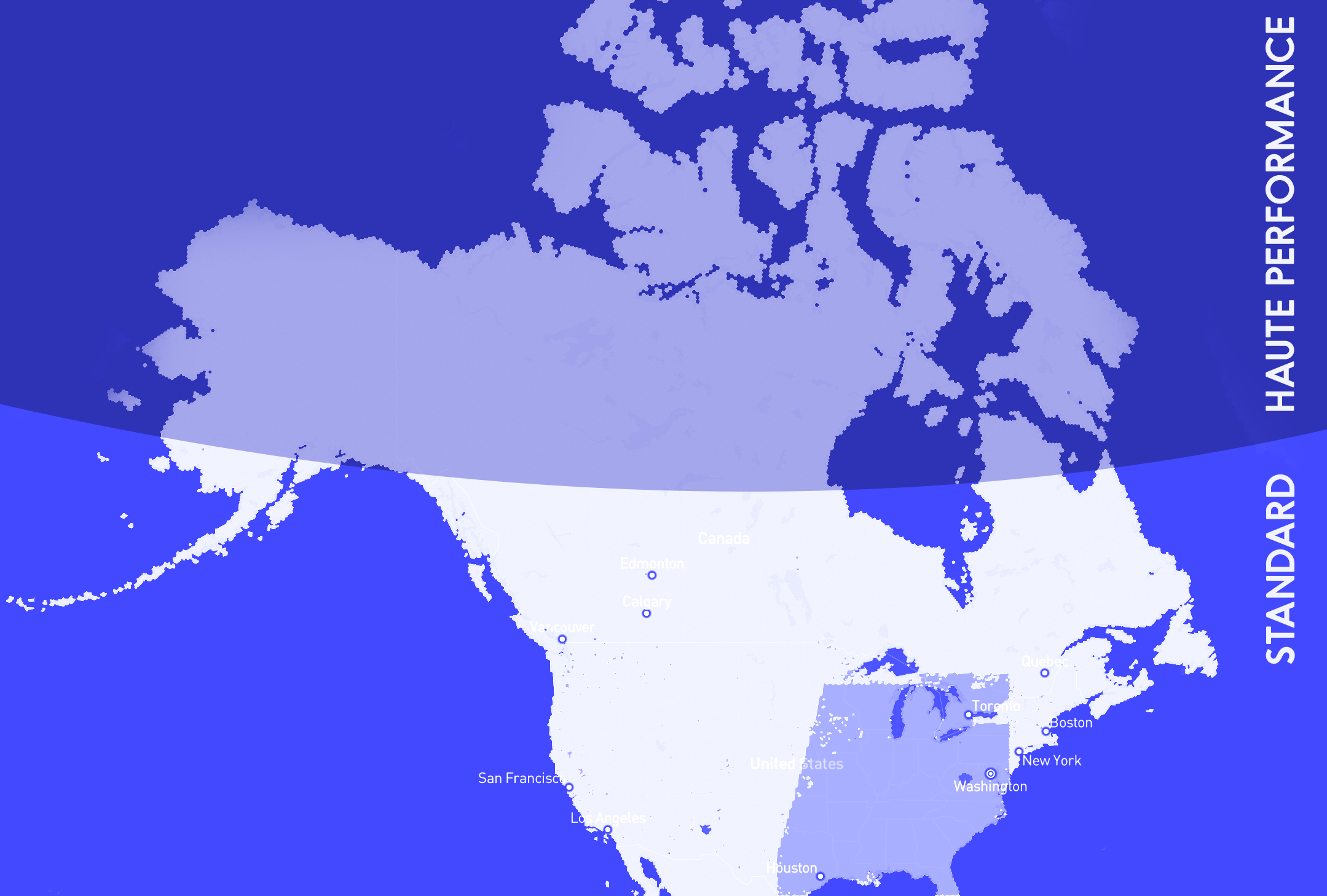October 4 2024 · 5 minutes to read
Key Takeaways
The High Performance option provides slightly higher speeds, better coverage, and improved reliability, but at a much higher cost.
Choice depends on individual needs, with High Performance being ideal for commercial use and those in challenging geographical areas.
Both options are user-friendly and designed for easy installation.
In the ever-evolving world of internet technology, understanding the differences between various services and equipment is the key for making informed decisions. This article delves into the specifics, particularly contrasting the Standard and Starlink High Performance options. This comprehensive guide will help you understand which Starlink option is right for your satellite internet needs. Read on whether you're a tech enthusiast, a remote worker, or a Starlink user living in an area with limited internet options.
Table of content
- What is Starlink?
- Understanding the Basics: Standard vs High Performance
- The Starlink Dish: Standard and High-Performance Variants
- Speed and Performance: How Do They Compare?
- Coverage and Field of View: A Technical Perspective
- Setting Up: The Starlink Kit
- Cost Comparison: Standard vs High Performance
- Starlink for Different Users: Who Benefits from Which?
- Future-Proofing Your Internet: Long-Term Considerations
- Common Questions and Concerns Addressed
The Concept and Vision Behind Starlink
Starlink, a satellite-based internet service by SpaceX, is revolutionizing the world of internet connectivity. With its network of low-earth orbit satellites, it aims to provide high-speed internet across the globe, even in the most remote areas. Learn more about it here.
How Starlink is Changing Internet Access
Starlink's approach to internet service is a game-changer, especially for regions where traditional broadband is unavailable or unreliable. Its potential to bridge the digital divide and connect under-serviced areas is immense.
Starlink hardware comes in two options: Standard and High Performance.
Standard Option is ideal for residential users and everyday Internet applications. The Starlink Kit includes everything you need to get online in minutes.
High Performance Option is designed for demanding users, professional applications and users located in polar regions (latitudes above 60 degrees). It provides better speeds at high temperatures, connects to more satellites, and is more resilient to extreme environments. See the map below to identify the territories concerned.

Understanding the Basics: Standard vs High Performance
The Key Differences
The main distinction between Standard dish and High Performance Starlink lies in their technical capabilities. The High Performance option offers improved download speed, coverage, and reliability, but at a higher cost.
| Aspect | Standard Dish | High Performance Dish |
|---|---|---|
| Use Case | Suitable for most applications, including home internet, streaming, gaming, video calls, and web browsing | Aimed at professionals and customers living in harsh climates, more demanding applications, better for business use |
| Size | Lighter and smaller | Larger antenna |
| Reliability | Limited by service plan and network conditions | Better at dealing with obstructions, higher throughput capabilities, can see more of the sky, handles harsh weather better |
| Price | Costs $299 | Included with Business, Mobility, and Maritime plans, optional upgrade for Residential and Roam plans |
| Coverage | Field of view of 100 degrees |
Field of view of 135 degrees |
| Speed | 25 to 150. mbps |
25 to 220 mbps |
| Power supply | 50-75 watts |
110-150 watts |
Who Should Choose What?
When choosing between Starlink's Standard and High Performance dishes, the decision primarily revolves around usage environment and requirements. The Standard dish is a cost-effective solution tailored for residential users. It efficiently meets the needs of typical home internet activities like streaming, gaming, and video calls. This option is particularly suited for users in areas with clear sky views and fewer environmental obstructions, where the standard capabilities are sufficient to ensure reliable connectivity.
On the other hand, the High Performance dish is designed for users in harsher conditions and challenging environments. Its enhanced field of view makes it better equipped to handle obstructions like trees or buildings, ensuring more consistent and robust connectivity. This variant is ideal for professionals or individuals in areas prone to extreme weather or heavy geographical obstructions, where the standard dish might struggle to maintain a steady connection. While both dishes offer similar internet speeds, the choice depends on balancing cost-effectiveness against the need for enhanced performance in demanding conditions.

The Starlink Dish: Standard and High-Performance Variants
Physical and Technical Specifications
The Standard Starlink dish is lighter and more compact, while the High Performance variant is larger, with a wider field of view, enabling it to connect with more satellites.
Installation and Maintenance
Both dishes are user-friendly in terms of installation. The High Performance dish, however, might require more consideration due to its size.
Speed and Performance How Do They Compare?
Download and Upload Speeds
High Performance Starlink offers slightly higher download and upload speeds compared to the Standard option, which can be crucial for certain users. According to our inhouse test, there is no noticeable speed difference between the two options. The High Performance dish seems more stable but both dishes can achieve speeds of 200+ Mbps reliably.
Reliability in Different Weather Conditions
The High Performance dish is designed to offer better connectivity in diverse weather conditions, a critical factor in certain geographical locations.
Coverage and Field of View: A Technical Perspective
Satellite Visibility and Connectivity
The standard Starlink dish has a field of view of 100 degrees, while the high-performance dish has a wider field of view of 140 degrees. The high-performance dish is designed for more demanding applications, has higher throughput capabilities, can see and talk to more satellites, and handles harsh weather better. Additionally, the high-performance dish is available in a flat version for mounting to boats and vehicles, and it can be used in-motion. Therefore, the high-performance dish is better suited for professionals, power users, and consumers living in harsh weather environments, as well as for use in areas with a lot of obstructions, such as trees.

Impact on Internet Speed and Quality
A wider field of view directly translates to better internet speeds and quality, making the High Performance option a superior choice for those requiring robust connectivity.
Setting Up: The Starlink Kit
What’s in the Box?
Both Standard and High Performance kits come with all necessary components, including the dish, router, and cables. The High Performance kit includes additional mounts and accessories for optimal setup.
Ease of Installation
Starlink's user-friendly design ensures that installation is straightforward for both options, with detailed instructions available via the Starlink app.
Cost Comparison
Initial Setup and Equipment Costs
The price disparity between the Standard and High Performance kits is significant, illustrating the advanced features of the High Performance option. Currently, the Standard kit is priced at 4999 CAD, while the High Performance kit is available for 3,170 CAD.

Monthly Service Fees
While the monthly fees for High Performance are higher, it offers better value for users requiring faster and more reliable internet service.
Starlink for Different Users: Who Benefits from Which?
For residential use, the Standard Starlink is a suitable choice. It's designed to cater to the everyday internet needs of a typical household, efficiently supporting activities like streaming, web browsing, and video calling. Its design and performance are aligned with the requirements of a regular home setting, where the demands for internet connectivity are standard.
In contrast, for business applications and power users, the Flat High Performance Starlink dish is the more appropriate option. It excels in network integration and shows increased resiliency, particularly in challenging weather conditions. This makes it ideal for businesses that require a robust and reliable internet connection for critical operations, especially in environments where weather can significantly impact connectivity. The High Performance dish's enhanced capabilities ensure that businesses can maintain high productivity levels and uninterrupted service, even during inclement weather.
Rural and Remote Areas
Some remote areas may only be serviceable with the High Performance option due to geographical constraints. Prospective users in rural or remote locations should check the Starlink website to confirm the availability and recommended dish type for their specific area. By doing so, they can ensure that they choose a dish that not only meets their connectivity needs but is also compatible with the satellite coverage in their region.
Long-Term Considerations
Technological Advancements and Updates
The Standard Starlink dish, like most satellite dishes, is designed to function optimally for a substantial period, which aligns with the general lifespan expectations for this type of technology. While Starlink has not explicitly detailed the exact lifespan of their dishes, it's reasonable to anticipate about 10 years of effective service. Various factors, including the dish's build quality, regular maintenance, and exposure to different environmental conditions, play a roles in determining its actual lifespan.
In contrast, the High Performance Starlink dish is constructed with superior quality materials, enhancing its durability and potentially extending its longevity beyond that of the Standard model. This makes it a more robust choice, especially in challenging environments.
Regarding technological updates, note that advancements in satellite technology primarily occur in the network and software, rather than in the physical dish itself. Regular updates are typically delivered through the network, ensuring that the dishes, both Standard and High Performance, remain compatible with the latest satellite technology. There is usually no need for physical updates or modifications to the dishes themselves, as these updates are managed remotely, providing a seamless and maintenance-free experience for the user.
Scalability and Flexibility
High Performance Starlink provides more flexibility and scalability for future internet needs, especially as household and business internet requirements evolve.








